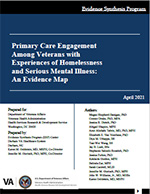
Prepared by:
Evidence Synthesis Program (ESP) Center
Durham VA Healthcare System
Durham, NC
Karen M. Goldstein, MD, MSPH, Co-Director
Jennifer M. Gierisch, PhD, MPH, Co-Director
Recommended citation:
Shepherd-Banigan M, Drake C, Dietch JR, Shapiro A, Alishahi Tabriz A, Van Voorhees E, Uthappa DM, Wang TW, Lusk J, Salcedo Rossitch S, Fulton J, Gordon AM, Ear B, Cantrell S, Gierisch JM, Williams JW, Goldstein KM. Primary Care Engagement Among Veterans with Housing Insecurity and Serious Mental Illness. Washington, DC: Evidence Synthesis Program, Health Services Research and Development Service, Office of Research and Development, Department of Veterans Affairs. VA ESP Project #09-010; 2021.
Download PDF: Complete Report, Executive Summary, Report, Appendices
Adults with experiences of homelessness, both those who have been homeless and those with housing insecurity, are more likely to suffer from higher rates of chronic illness and early mortality compared with those who are not homeless. Adults with experiences of homelessness experiences also have a higher mental health burden than the general population; about 20-25% of people who experience homelessness in the United States also have been diagnosed with serious mental illness (SMI). The VA National Psychosis Registry defines SMI as the presence of schizophrenia, other psychotic disorders, or bipolar disorder. Mental and behavioral health disorders threaten household stability, which, in turn, leads to poor community integration and engagement with medical care. Hence, both experiences of homelessness and mental illness are vulnerabilities that negatively impact health and receipt of health care. Individuals with experiences of homelessness and SMI would benefit greatly from longitudinal medical care delivered in the context of a population-tailored clinical setting, yet the underlying context of both experiences of homelessness and SMI create notable barriers to accessing and engaging with traditional clinic-based primary care. As a result, these individuals receive less preventive care and chronic disease management and often receive the majority of their health care in episodic acute care visits delivered in more costly locations such as emergency departments, which are ill equipped for the complexity of this patient population.
Previously developed interventions have focused on collaborations between primary care and either persons with SMI or persons with experiences of homelessness, but few interventions have targeted both populations simultaneously. To date there have been no systematic examinations of the breadth of the literature about interventions that attempt to improve engagement in care for populations with intersecting needs related to SMI and experiences of homelessness. For health systems to better meet the health care needs of this complex population, it is critical to learn about the types of interventions, strategies that have been tested, and outcomes evaluated to better connect patients with housing insecurity and SMI to primary care. In this evidence map, we systematically examine the literature and provide an overview of the quantity and distribution of intervention types and components that were assessed to improve engagement in primary care for individuals with experiences with homelessness and SMI.
Key Question #1: What intervention strategies have been studied among adults with experiences of mental illness (SMI) to promote engagement in primary care?
Key Question #2: What measures have been used to evaluate interventions among adults with experiences of homelessness or at high risk of becoming homeless and who have SMI to promote engagement in primary care?
Primary Care Engagement among Veterans with Experiences of Homelessness and Serious Mental Illness: An Evidence Map (Management eBrief)
Shepherd-Banigan M, Drake C, Dietch JR, et al. Primary Care Engagement Among Individuals with Experiences of Homelessness and Serious Mental Illness: an Evidence Map. Journal of General Internal Medicine. Published online March 8, 2022. DOI: https://doi.org/10.1007/s11606-021-07244-z.